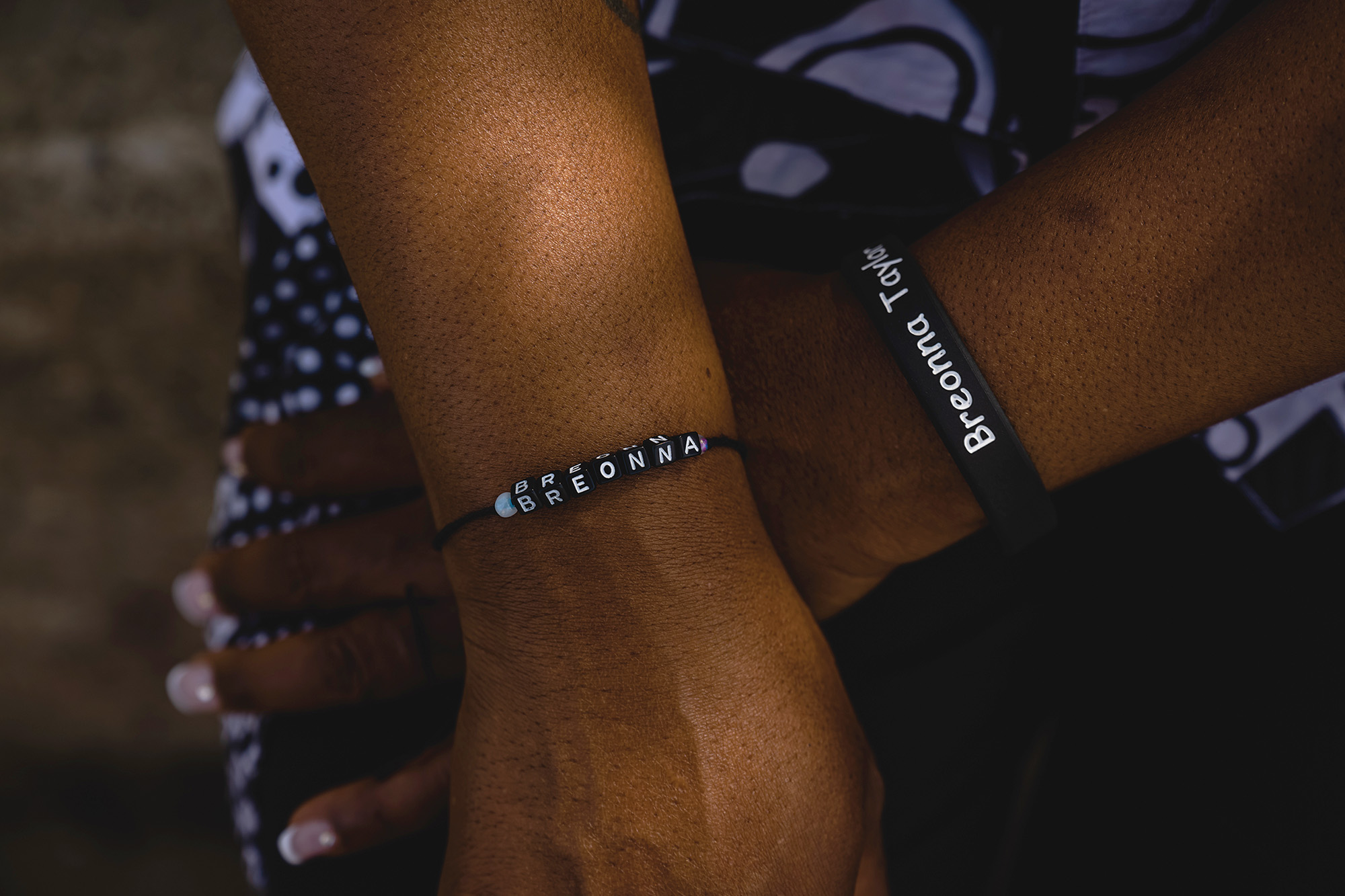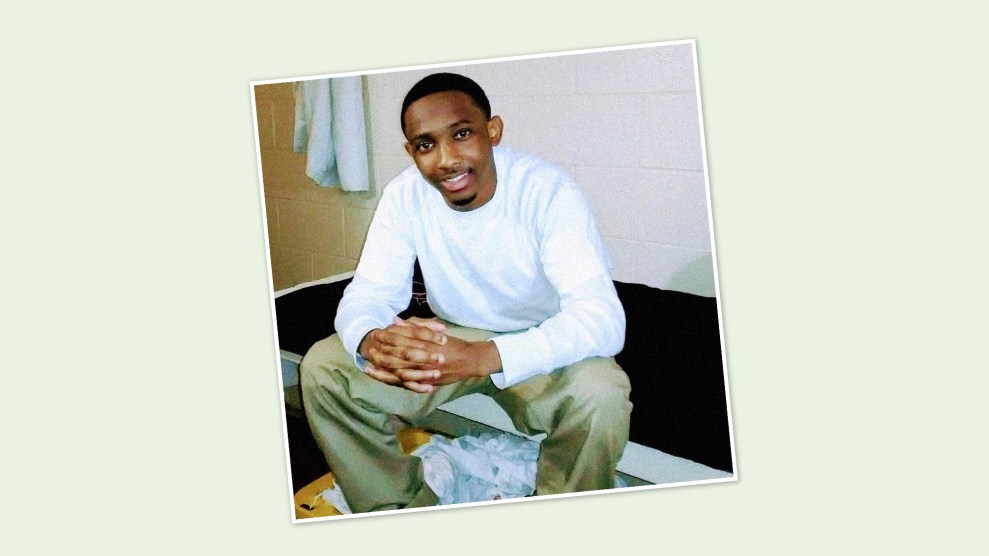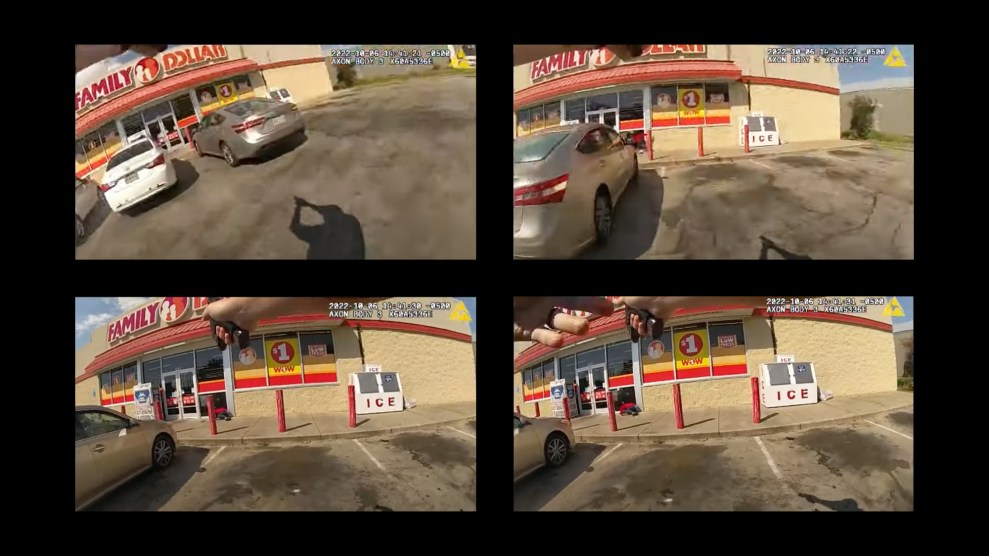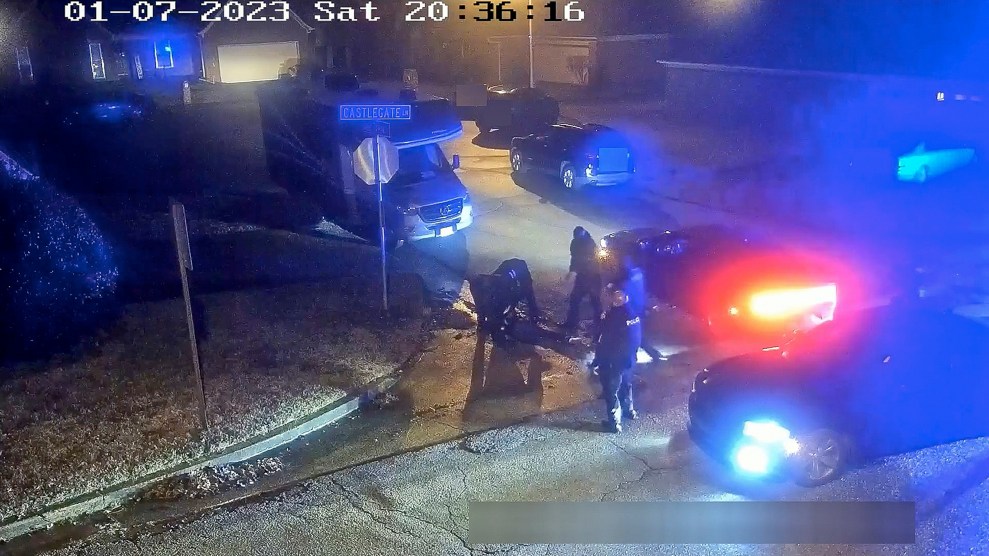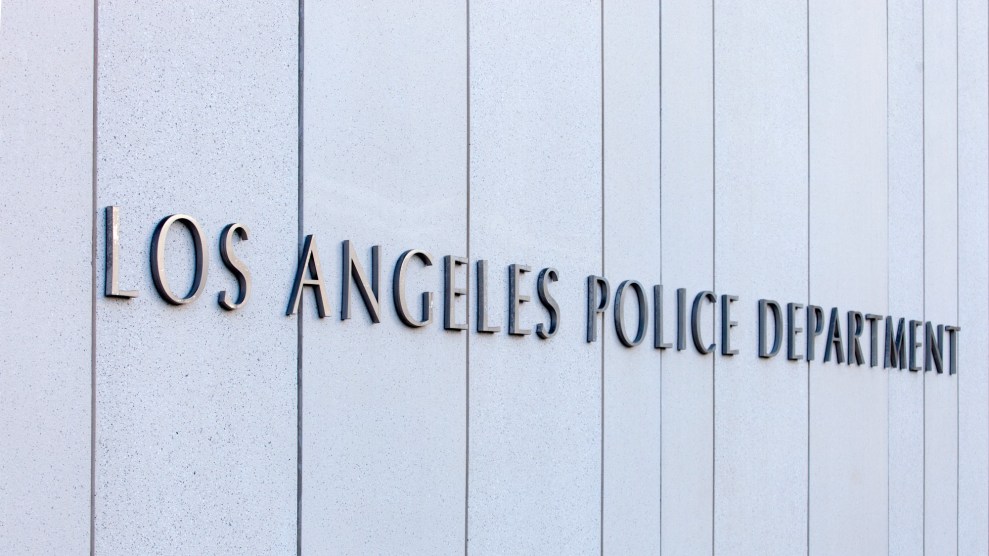On a warm Friday afternoon in February, Bianca Austin waits in her Airbnb in Gulfport, Mississippi, for a new friend to come by. “Hey, girl!” she says, jumping up from her chair as Katrina Mateen walks through the front door in a trenchcoat, her face framed by big sunglasses and a sparkly baseball hat. They hug like they’ve known each other for ages, though they only met last October, after police shot and killed Mateen’s son outside a nearby Family Dollar store. His birthday was earlier this week—he would have been 16—and she and Austin spent the prior night trying to bail out some protesters.
“You get some sleep?” asks Austin, who drove from the airport to the jail around midnight.
“I was knocked out in that car,” Mateen replies; they’d waited outside the jail till 6 a.m.
“I know you was!” says Austin.
Austin lives in Kentucky but has come to Gulfport repeatedly to help Mateen, feeling a special kinship. It wasn’t too long ago that police in Louisville shot and killed one of Austin’s nieces, Breonna Taylor. “You just see somebody in pain, and you know the pain they’re going through,” Austin says. “You just want to embrace them and try to be there.”
Across the United States, the police fatally shoot more than 1,000 people every year, representing nearly 5 percent of all homicides—a higher death toll than from mass shootings. Some of these cases make national news, but most don’t. Even less attention is paid to the families left behind: thousands of people, disproportionately Black, Indigenous, and Latino, who must navigate not only their grief, but the stress of protests and the press, not to mention agonizing questions of how to seek accountability from the officers who killed their loved ones.
“It’s a different fight when you up against a system that was supposed to serve and protect you,” Austin says. “There’s not a handbook for tragic situations like this.” Police who kill often receive therapy, paid leave, and lawyers—much of it publicly funded—but there’s usually little to no government support for families. In that absence, Austin and her close friend Jacob Blake Sr., whose son was shot by a cop in Wisconsin, travel around the country supporting surviving family members by, as Blake puts it, “making yourself available to them any way they want.”
There’s another protest tomorrow, in front of the Family Dollar store, and they meet up later in the evening to plan for it, joined by a handful of other organizers. Mateen mentions she has a call in a few days with the Justice Department about her son’s case. Blake offers to join. “We’ll be at the Airbnb, you come over,” he suggests. Mateen nods with relief. “I don’t know what I’m gonna hear,” she tells me. “They want to look out for me.”
There’s stress and sadness in the room, but at times it also feels like a family reunion. On the couch, someone laughs and playfully slaps Mateen’s shoulder after she makes a funny comment. She chuckles as someone else impersonates an activist from out of town who seems more interested in building an Instagram following than helping her and her son. Austin, her auburn braids pulled up in a bun, hovers around the kitchen table as Mateen’s 20-year-old daughter, Amera, a scrunchy around her wrist, eats a plate of chicken and mashed potatoes. There’s a colorful king cake on the counter waiting to be devoured. Austin’s fiancé rubs her shoulders.
It’s a full house, something 42-year-old Austin craved after she lost Breonna in 2020—the same week her city went into lockdown for the pandemic. She laughs now with Mateen’s daughter. “I don’t want people to feel alone,” she told me earlier.
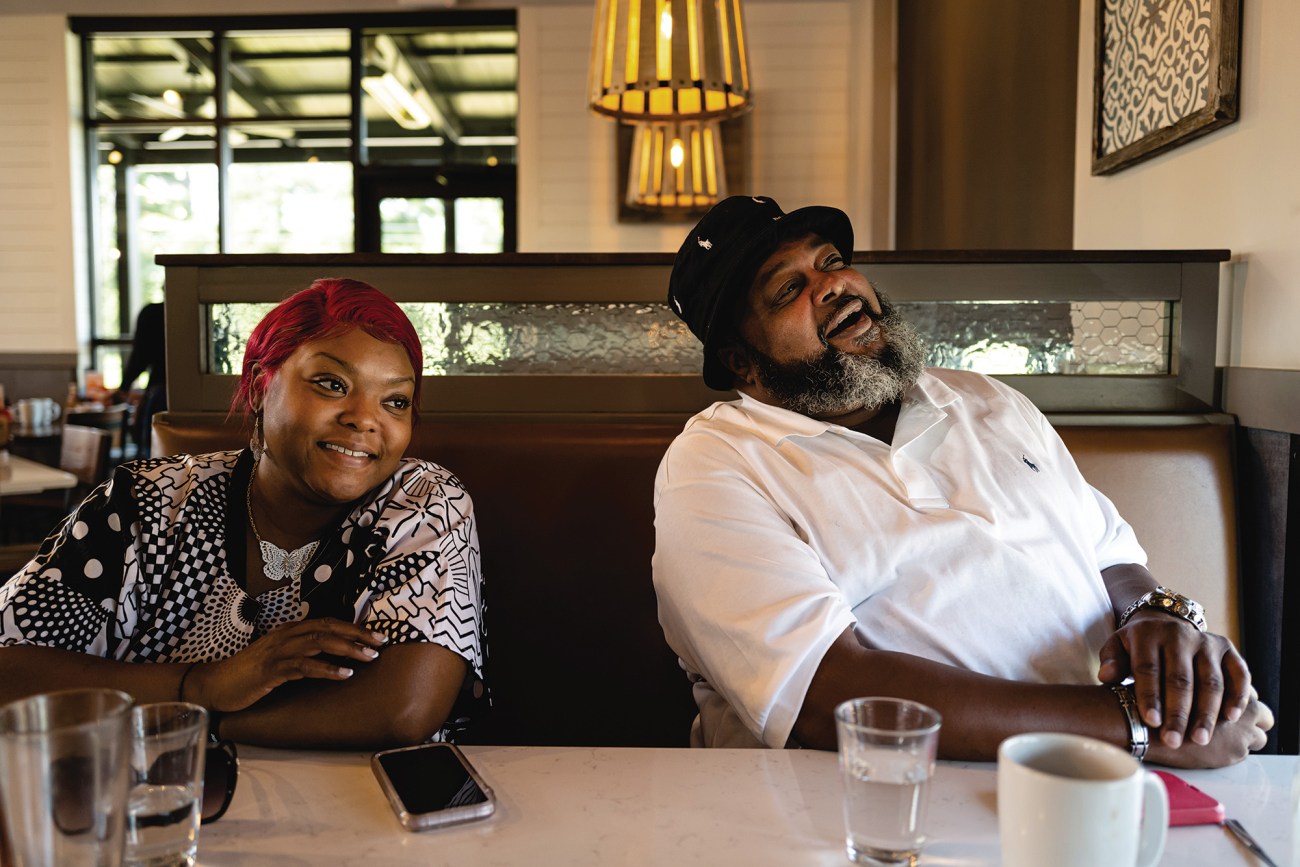
Bianca Austin and Jacob Blake Sr. converse over lunch at a restaurant in Louisville.
Jon Cherry
That desire for community has led her and Blake to build a network of mourning relatives who lean on each other after police violence. They call themselves Families United. “It’s a relatively new and beautiful way of organizing: having the families support each other,” says Melina Abdullah, who co-founded the first Black Lives Matter chapter, in Los Angeles in 2013, and who’s in the room now with Blake, Austin, and Mateen. Although police brutality has long beset communities of color, it’s only within the past decade, she says, that victims’ family members have teamed up like this on the front lines, offering each other the care that no one else can. Most racial justice activists “want to provide support,” she says, counting herself among them, but “we don’t know what it feels like to have your loved one stolen by the state.” As Austin puts it, “It’s a different kind of grief.”
Together, Austin and Blake hope to help families get the national attention they deserve without speaking over them: to listen to each person’s needs and be a sounding board as they navigate situations that often lack a clear path forward. “It’s so hard to find help—like, what’s the starting point? How do you know who’s trustworthy?” Austin says, reflecting on Breonna’s death. “Because if you don’t know, you don’t know. You don’t know at all.”
Early in the morning on March 13, 2020, Austin awoke to what looked like a flashlight in her eyes. “Mom, people been trying to call you!” her daughter said, pointing the brightly lit phone at Austin’s face. Eighty-three missed calls. Disoriented and groggy, Austin held it to her ear and heard her sister Tamika Palmer say something panicky she couldn’t quite make out, something that sounded like, “B, where you at? Bre’s dead.” Austin’s daughter screamed, and Austin, startled, threw the phone like it was a piece of burning coal.
“What did you just say? What’s going on?” Austin asked after dialing back.
“You need to get to the hospital now,” her sister said.
Okay, I’ll meet Breonna there, Austin told herself, not processing that her 26-year-old niece could really be dead. They’d talked on the phone the night before, before dinner. Maybe she went to a club afterward and something happened; she got caught in crossfire, Austin thought. Maybe she’s hurt.
Breonna was in some ways Austin’s mini-me. They were both aspiring nurses, and they loved to sing. When Bre was in kindergarten, she liked Austin’s purple braids and asked if she could get some coloring in her own—grinning widely as she flipped her purple hair the next day when she got off the school bus. Bre wasn’t the type of girl to get in trouble, working two jobs and saving up for a house. None of it made sense.
Austin drove toward the hospital, but then her sister called—Bre wasn’t there.
Confused, Austin drove to meet her sister at home. Bre wasn’t there either.
So she gathered her sister and all the other confused, crying people around her, and they drove to Bre’s apartment, where yellow security tape hung in the parking lot.
“She’s in there,” a police officer told them, gesturing to the building.
What the fuck does that mean? Austin thought.
Then the coroner pulled up, and it was clear. “I’m sorry for your loss…” he started to say, as Palmer let out a wail and collapsed. Another officer handed Austin a business card, instructing her to call for a police report in six to eight weeks. “That was it,” Austin recalls.
Palmer, sobbing on the ground, had a little more information: Her daughter’s boyfriend, Kenny Walker, had called her the night before, hysterically screaming that some men broke into their apartment and shot Bre.
After he hung up, without specifying who broke in or whether Bre had survived, Palmer assumed the worst but also hoped that she was wrong. Now the coroner had confirmed her fears, and making matters worse, it was starting to seem like the police weren’t being honest. Palmer recalled how, when she drove to the apartment right after Kenny’s call, an officer outside told her Bre was in the hospital, while she was actually bleeding out inside.
Soon, the family learned that the police arrested Kenny, and their confusion grew: Had he attacked Bre, as uncharacteristic as that seemed? Or was it burglars, like he’d suggested? It wasn’t until they got a lawyer two days later and went inside the apartment that they suspected something else entirely. The place looked like a war zone, with bullet holes through the patio, front door, and just about every wall, and a pool of blood at the end of the hallway.
In the coming weeks, through phone calls with Kenny, news reports, and police documents their lawyer subpoenaed, the family learned what really happened: Breonna had fallen asleep watching the movie Freedom Writers when, a little after midnight, seven plainclothes police barged through her front door with a battering ram. They were looking for drugs—her ex was a dealer. Kenny, thinking they were intruders, grabbed his gun and fired a single shot, and the officers returned with a barrage of bullets. As Breonna lay wounded, Kenny called 911, still not realizing it was the police who had attacked them. An officer would later admit to falsifying an affidavit to enter the unit; there were no drugs there.
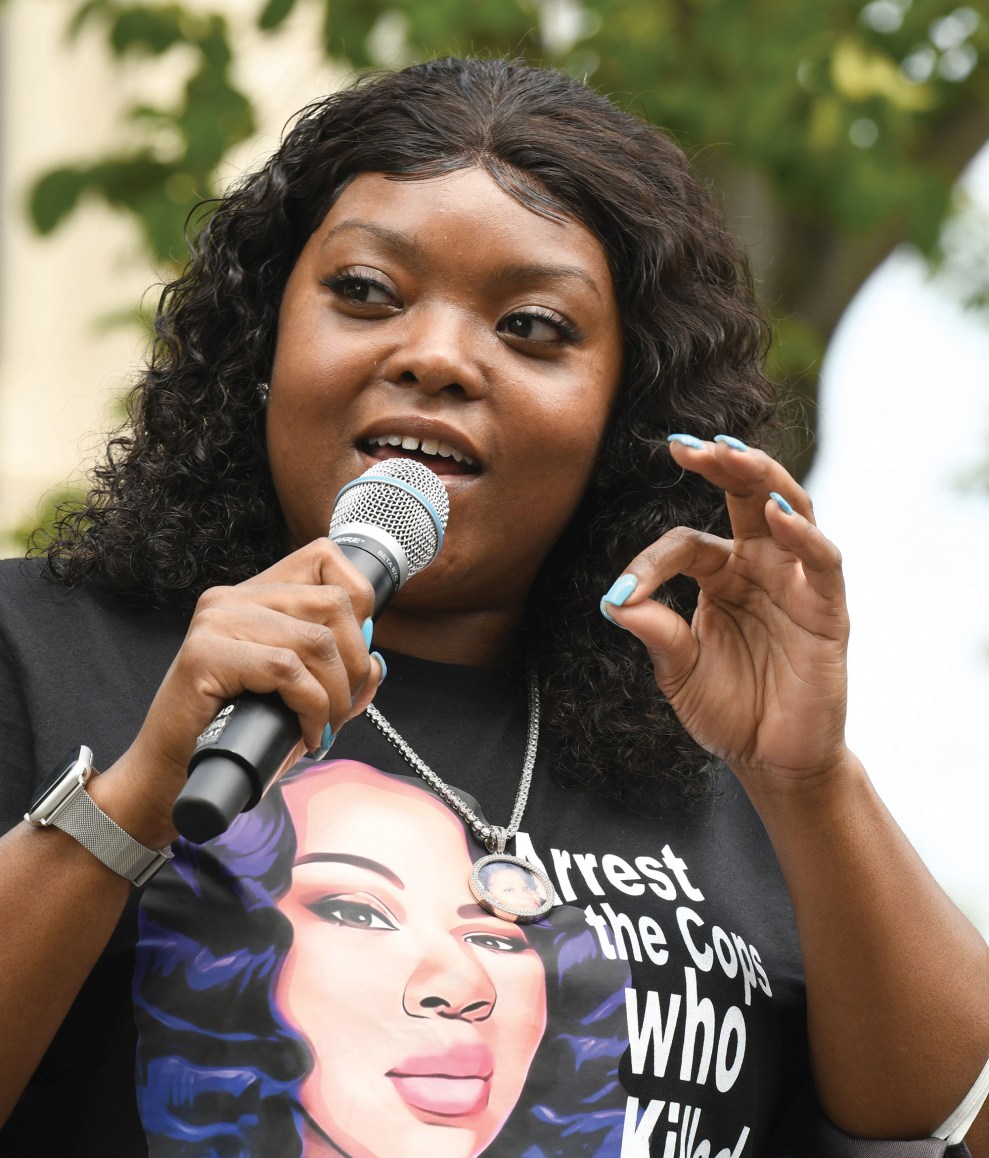
Bianca Austin speaks at a rally in Kenosha, Wisconsin, to commemorate the one-year anniversary of the shooting of Jacob Blake Jr.
Mark Hertzberg/Zuma
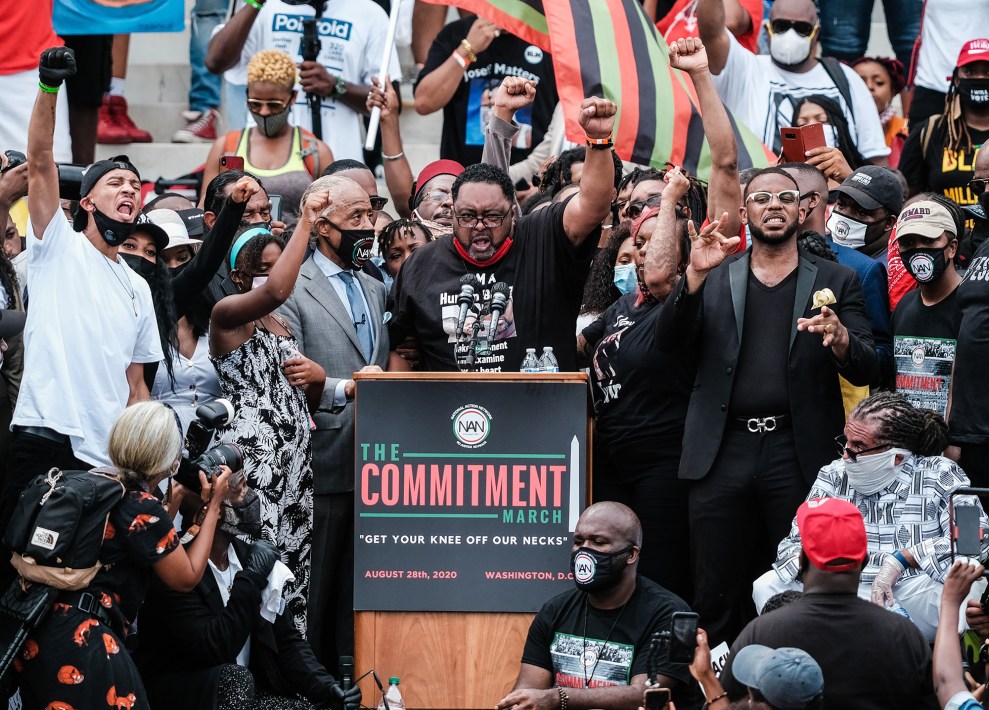
Jacob Blake Sr. speaks during the March on Washington in August 2020.
Michael A. McCoy/The New York Times/Redux
If Breonna’s family had wanted to protest, they couldn’t. She died the same month Louisville’s mayor told residents to shelter in place. “The city was shutting down; like, just go in your house and be quiet,” Austin says. She struggled to find a church that would host a funeral and tried to stay strong for her siblings: Palmer was so anguished she could hardly talk. Their brother was recovering from a stroke, and their sister Tahasha Holloway was severely sick with Covid, as was an elderly relative who died that week. “I went into defensive mode,” Austin remembers. “Like, ‘I can’t allow myself to be weak right now, I don’t want to cry right now.’” She spent hours hunched over a laptop, telling people about the shooting and dispelling rumors that Breonna was involved with drugs. “Somebody had to be the level-headed one,” she says.
“B literally took charge,” Holloway, the oldest of the three sisters, says of Austin, the youngest. “She was our speaker.”
“But she couldn’t stop,” Holloway adds. “She had worked herself into a real-live frenzy. You had to kind of pull her to the side: ‘You need to go sit down.’”
For a month, Austin could not sleep at night, despite the pills her doctor prescribed. If she was lucky, she’d doze off for an hour during the day, but even then she had nightmares. The hospital where she worked was inundated with Covid cases that nobody knew how to treat, and she felt like she spent most shifts flipping dead bodies. “I go home and it’s tragedy. I go to work, it’s a catastrophe,” recalls Austin. “I was so overwhelmed.”
As Breonna’s story eventually went viral and the country learned her name, Austin was further demoralized: The media took misleading soundbites from her interviews. She felt like politicians and even some activists spoke about the killing to boost their own popularity.
And it seemed the cops would never face consequences for what they’d done to Breonna. That September, the state attorney general announced he would not press charges against the officers who shot her. Austin, devastated, organized a press conference with her family. “At this point, I’m just fed up…ready to crawl back in my hole,” she recalls. “I didn’t think I had the strength to keep going and deal with the politics behind fighting the police.”
Then she saw someone at the press conference, a Black man with a linebacker’s build and a face mask emblazoned with “Justice for Jacob.” Something about his eyes looked familiar; she thought she recognized him from TV. Ben Crump, her family’s attorney and a renowned civil rights lawyer, said he was Jacob Blake Sr., the father of the 29-year-old who’d been shot by police in Wisconsin a few weeks earlier. Austin felt sympathy, then surprise. “I’m like, ‘I was literally just watching your son get shot. You’re dealing with your own stuff—why are you here?’”
Jacob Blake Sr. had gotten a phone call the night before, alerting him to the press conference. He drove overnight to be there.
He’d been driving a lot lately. In August 2020, he was in his silver Hyundai sedan, heading to his favorite Thai restaurant in Charlotte, North Carolina, where he lived, when someone texted him a video circulating online, of a white officer shooting his son Jacob Blake Jr. seven times. Blake Sr. immediately went home, packed his bags, and started toward Kenosha, the mountains, fields, and towns passing in a blur. “That was the longest drive of my life, because at that time I never looked at the video past the first shot,” he says. “So I don’t know how many times my son was shot, I don’t know if he’s alive, I don’t know what’s going on.” When he arrived, he found Blake Jr. paralyzed from the waist down, with gunshot wounds and damage to his stomach, kidney, and liver. Protests followed, and a 17-year-old civilian, Kyle Rittenhouse, went to one and shot three people, two fatally.
Blake Sr., a former college football player and bodyguard, is a big man with a booming voice, but he wears his emotions on his sleeve and is not afraid to cry. After his son’s shooting, he would wake up at 2 a.m. some days and weep. But his family and friends supported him, and he never felt alone.
Then in September, Crump, who was also his family’s attorney, called and said Breonna Taylor’s mother needed help. Blake got on the phone with Palmer. “I said, ‘Baby, you sound so tired.’ And she’s like, ‘Yeah, we got this big press conference tomorrow and I don’t know what they’re gonna say.’ So I said, ‘I’ll tell you what: I’m gonna come and stand with you tomorrow, and I’m gonna let you draw off my energy.’ She said, ‘You would do that for me?’ I said, ‘I’ll be there in the morning.’”
“It was the first time another family member came down and stood in solidarity with us,” Austin says.
Afterward, Blake went with them to lunch and sat next to Austin. They quickly bonded. “He was the only one throwing out the F-bombs besides me,” she says with a laugh. “I was having a bad day, just kind of expressing myself and going off, and he was going off right along with me, telling me, ‘You okay to feel the way you feeling. Don’t bottle it up.’ It was a relief.”
Austin confided that she didn’t think she could trust anyone, that she was tired of officials and activists using her family’s story to bolster their campaigns, gain followers, or just get five minutes of fame. People were even selling T-shirts with Bre’s image; it felt like everybody was trying to profit. Blake “was like, you have to trust somebody,” Austin says, “and along with that, you can set boundaries.” Her shoulders relaxed, and after lunch they hugged and exchanged numbers. He called later that night to make sure the family was okay. And he invited them to a demonstration for his son the next month near Chicago, offering to pay for their hotel. “He makes you feel like he really do care about you, and he’s gonna ride for you,” says Holloway, Austin’s sister.
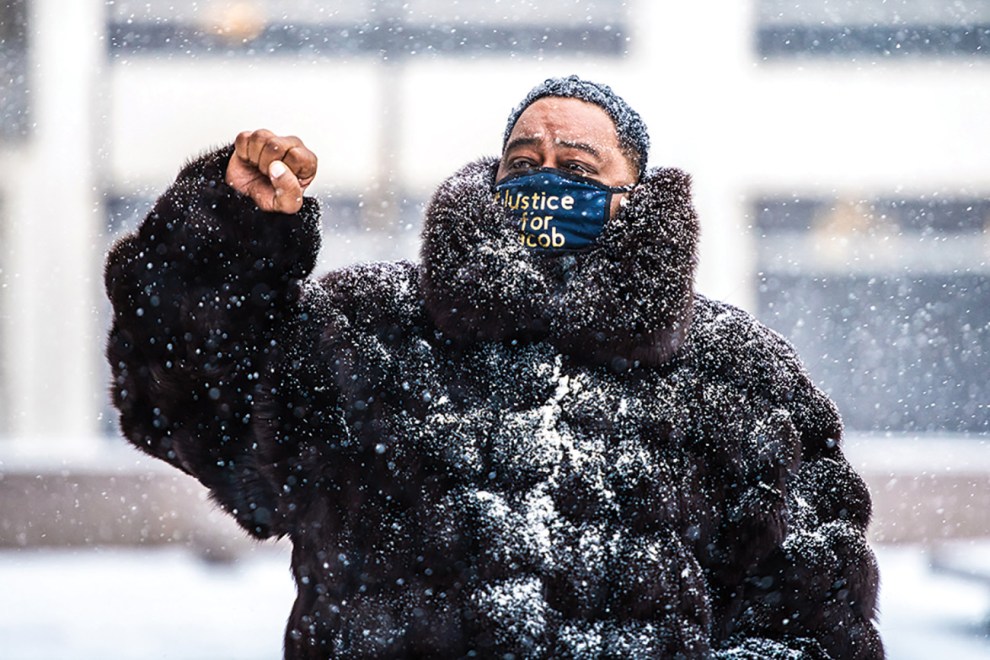
Jacob Blake Sr. arrives at a courthouse in Minneapolis for the December 2021 trial of Kim Potter, the police officer who killed Daunte Wright.
Chris Tuite/imageSPACE/Zuma
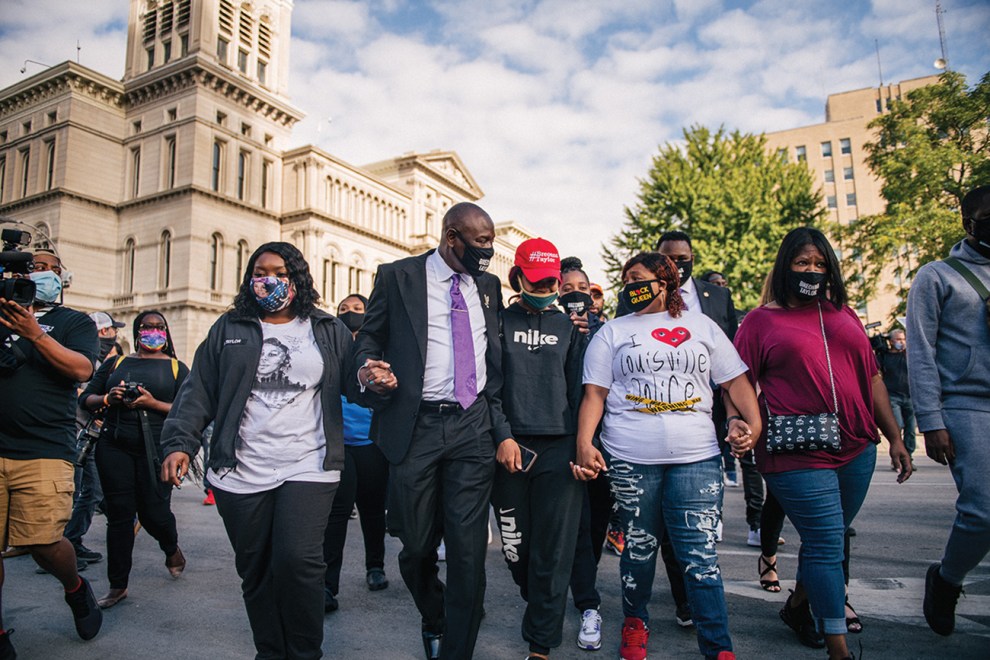
Bianca Austin, left, walks with attorney Ben Crump and Ju’Niyah Palmer, Breonna Taylor’s sister, along with Taylor’s mother, Tamika Palmer, and attorney Lonita Baker ahead of a news conference in Louisville on September 25, 2020.
Brandon Bell/Getty
Blake’s family has a long history of activism: His late father, a reverend in Evanston, Illinois, had organized against redlining in the 1960s, participated in the march from Selma, Alabama, to Montgomery, and even knew Martin Luther King Jr. Blake, 56, grew up playing with the Reverend Jesse Jackson’s children and once met then-Sen. Joe Biden while hanging out in the study of his dad’s friend, a state legislator. When he invited Austin to Chicago, “it was like a no-brainer,” she says. “How can I tell you no when you drove overnight to be there” for us?
They soon became close friends, surprised at how much they had in common. They’re both Aries, with birthdays six days apart, and they each have a young son, ages 10 and 14. They have similar personalities, too—leaders who love to take charge, but also introverts who need time alone. And of course, they were both grieving. “It’s a trauma bond,” Holloway says of their relationship. They talk on the phone so many times a day and spend so much time together that strangers often mistake them for a married couple.
In January 2021, they were invited to DC for Biden’s presidential inauguration, where they sat together in coveted seats near the stage. It felt like a Cinderella moment to Austin, who framed her ticket when she got home; she thought Breonna would have been proud. But on the drive back, Blake’s legs swelled, and by the time he arrived he couldn’t walk. He was soon hospitalized for congestive heart failure, and in the hospital he got infected with C. diff, an often fatal type of bacteria. Doctors said his chances of surviving were slim.
When his nurses told Austin he’d been intubated, she burst into tears. I can’t afford to lose him, she thought. It’ll break me.
Slowly, Blake recovered, relearning to walk. Austin, with her medical training, helped him manage his medications and take care of himself. “She’s everything to me: my nurse, my confidant, my little sister,” he says. “She keeps all the t’s crossed and the i’s dotted.”
As Austin grew closer to Blake, she thought about all the parents whose experiences of police brutality never made the news.
Some of them approached her as she traveled to protests for Breonna and George Floyd, whose May 2020 murder by Minneapolis police sparked nationwide protests that brought more attention to Bre’s case. “It was a cry for help everywhere we went,” she says. “A family pulling us to the side, telling us about a tragedy that happened to them.”
These families were struggling to get help from local governments, which rarely prosecute police. They didn’t qualify for state victim funds, money that could help them cover therapy, burials, and other expenses, because officials didn’t see them as victims; deaths by law enforcement often aren’t considered crimes under state and federal laws. If relatives needed financial assistance, they had to sue the government for it, a stressful process that didn’t guarantee results.
Several years ago, a grieving uncle in Oakland, California, began an effort to organize families together after police violence. Cephus “Uncle Bobby X” Johnson, whose nephew Oscar Grant was killed by a transit cop in 2009, felt frustrated by the lack of resources. He wanted families to have more say in activist circles: At the time, says BLM’s Abdullah, a professor of Pan-African studies at California State University in Los Angeles, organizers rarely worked directly with impacted relatives—they were more focused on addressing systemic injustices than assisting individuals. That started changing in 2014, when Johnson co-launched Families United 4 Justice, a network that now consists of 200-plus families who gather for retreats and protests and to lobby for policy changes. Two years later, Hillary Clinton campaigned alongside Black mothers whose children were killed by police or gun violence, including Mike Brown and Eric Garner. The Mothers of the Movement, who became known for their oratory, took the stage at the Democratic National Convention. Some of them, like now-Rep. Lucy McBath, whose son was murdered by a white man at a gas station, went into politics.
It wasn’t inevitable that Austin would follow a similar path; she already felt overwhelmed by the responsibilities she’d taken on after police killed Breonna. But Blake encouraged her. “Sis,” Blake told her, “you don’t realize that when you speak, people listen.” With donations from the Reverend Al Sharpton and others, the two friends formed their group to help families—whether by showing up at funerals or protests, amplifying demands on Facebook, connecting people with lawyers, or just hanging out and letting them vent. “Some people will never get justice,” Austin says. They need “somebody to listen to their story and understand.” As the pair began their work, they learned about Uncle Bobby X’s group in California and realized they’d coincidentally chosen a similar name, though each outfit has a different vibe: While the former is especially known for its annual healing-centered retreats, Blake and Austin would gain a reputation for actions that are a little more in your face.
“We’re not asking for a goddamn place at any goddamn table!” Blake yelled into the megaphone at a recent protest. “We comin’ with the table and the chairs, and we set up the table!”
Blake’s “a firecracker,” says Holloway, Austin’s sister. “He’s so straight to the point.”
Austin, Blake, and others in their group stood beside George Floyd’s family when ex-officer Derek Chauvin was convicted of Floyd’s murder in December 2021, and they joined them in Houston, where Floyd grew up, to open a community center in his honor. After police killed 20-year-old Daunte Wright during a traffic stop in a Minnesota suburb, Austin became friends with Wright’s mother, even vacationing with her after attending the officer’s manslaughter trial. They both joined a group chat of other families coping with police violence, checking in with texts as simple as we love you, good morning, is everybody okay? Often, “it’s never any meat,” says Blake of the daily messages. “Sometimes a person just needs to know that you’re there.” More invitations came, not just from families who’d experienced police shootings, but from communities grieving other racist violence. Austin and Blake went to Buffalo, New York, after a white supremacist killed 10 Black people at a supermarket, and they marched with Ahmaud Arbery’s parents in Selma.
But they especially prioritized families whose loved ones’ deaths did not get as much media coverage: Cameron Lamb in Missouri. Fred Cox and Jason Walker in North Carolina. Andrew Joseph III in Florida. When police in Illinois killed 19-year-old Marcellis Stinnette, whose mother is Blake’s distant relative by marriage, they attended the memorial and brainstormed ways to draw attention to his case, like a protest march on his birthday. Austin and Blake spread the word about these lesser-known killings while trying not to overshadow the families. “They were like a breath of fresh air,” says Lakeisha Nix, who met the pair after police in Delaware killed her brother, Lymond Moses. “I like the way Jacob and Bianca, they don’t want to tell your story for you; they want to give you a platform. They ask you, what is justice for you? That to me is the gold standard of how you support other families.”
Austin and Blake seemed genuine to Nix, who worried that other activists had ulterior motives, offering help in exchange for clout. She had reason to be skeptical: The massive outrage at Floyd’s murder in 2020 suddenly infused the police accountability movement with millions in donations, helping it grow, but also creating a profit incentive to approach families and use their stories. Previously, this activism hadn’t been lucrative—some organizers dipped into their own paychecks—so “families understood it’s costing us something, we’re not benefiting,” says BLM’s Abdullah. But soon, more families began to doubt activists’ motives, and a wedge grew—sometimes fueled by opponents of the police accountability movement who told grieving relatives to watch out for selfish organizers. “One family was told that every time we say her child’s name, we get royalties,” says Abdullah, “like it’s a record or something.”
Exploitative racial justice activists remain the exception, not the rule, she says, but they can drain families anyway. “The politicians and activists and some of the organizations are like vampires—they suck the energy out of a story and get the most they can get,” says Blake. It can make families feel like meat, like they only matter for clicks. “You’re not fighting for families; you’re fighting for attention,” he says.
In Mississippi, Mateen vents about the same problem. She tells Austin and Blake about some out-of-state activists who raised $100,000 around her son’s case, then came to town, splurged $12,000 on an Airbnb with a swimming pool and a lavish bar-and-game room, and did little to actually help her family—dropping off a “gift” for her surviving 9-year-old child that totally missed the mark. “A pair of socks? I mean, I can buy him socks,” Mateen says with frustration. “My [dead] son ain’t even got a tombstone.”
“They try to dictate how they wanna help you instead of helping with things you already have planned,” Austin says. As Blake did with her, Austin tries to guide Mateen through the complicated maze of choosing whom to trust.
The most important thing, Austin tells her, is for people to ask what the family needs. Each situation is different. “We standing behind y’all,” she says. “We not in front.”
The morning of the protest, Austin and Blake join Mateen in the Family Dollar parking lot as a few dozen people gather around them with handmade signs. Mateen stands with her back toward the store’s entrance, where a memorial sits in the sun: fake flowers, candles, and teddy bears faded from winter weather, along with sticky notes taped to the windows with messages like “He was only 15.” Another sign, posted by store management, seems more tone-deaf, urging shoppers to remove their hoodies before entering.
In October 2021, Mateen, who is 41 and Black, got a call from a friend who told her to get to the Family Dollar. “Jaheim’s been shot,” her friend said. Jaheim McMillan had been hanging out with friends. Police claimed they shot him in the head because he turned toward one of them with a gun. Some witnesses said he was unarmed and had his hands up, and that he bled out for minutes without medical care. Mateen raced to the store, parking across the street and running through traffic to her wounded child. An officer with a red beard grabbed her before she could reach Jaheim, and others surrounded her as she shouted that she needed to see him. “Shut up and calm down,” she recalls one telling her; she screamed as they handcuffed her.
Jaheim died two days later. It would be months before law enforcement released bodycam footage, which showed an officer firing eight shots at him as he tried to flee. The officer, who was cleared of wrongdoing, said Jaheim held a gun while he ran but did not have it in his possession as he lay wounded; police said they later discovered one in the parking lot.
Austin and Blake learned about the shooting when their phones started blowing up from people tagging them on social media. A Mississippi organizer connected them with Mateen, who invited them to a protest and the funeral. When Austin approached to pay her respects, Mateen begged her not to leave her side. “I don’t want to overstep,” Austin recalls saying, wondering if Mateen would prefer to have the time with loved ones. “She said, ‘Nope, I just need somebody [like you].’”
“I felt safe, like I had people around me who knew what I was going through,” says Mateen. “They had compassion for my son, and they didn’t even know my son.”
Most of Mateen’s friends and neighbors had no experience with this mix of grief and rage. And while they sympathized and sent donations, some couldn’t risk protesting. In such a small city, where so many businesses are white-owned, they worried about losing their jobs. Others feared retaliation from the cops. “The police will literally set your ass up here,” says Mateen. But Austin and Blake kept flying back, organizing a boycott of Family Dollar as they pressured it to release surveillance footage of the shooting.
Now at today’s protest, Mateen, her arm wrapped around her 9-year-old son, stands with a straight face, her eyes covered with sunglasses. She still cries most days. Her lawyers advised her not to speak at this demonstration because an investigation is underway, and there is always a chance officials might use her words against her. So at her request, Austin, Blake, and others lead the rally instead. Austin still gets nervous before speeches, but when she takes the megaphone it’s like a switch is flipped, and her voice turns fiery: “I can’t stand to come out here and see a grieving mother have to deal with some bullshit!” she says, her hand on her heart as she paces. “This shit is real life for us! We not out here for show! We still burying and going to court for our kids, man.”
“If we all go together and tell our stories,” Austin says, “it makes a better chance of somebody getting justice.”She looks ahead and slows down, with a message not just for the police, but for other activists. “Don’t come to Gulfport and be part of the problem,” she says, alluding to the protesters who bought the socks and, two days earlier, landed in jail after escalating a demonstration against Mateen’s wishes. “We wasted resources on bailing y’all asses out, $100,000.” Four of Jaheim’s friends, she points out, were arrested and expelled after he got shot. “They need lawyers and a school scholarship.”
Blake soon steps forward calmly, with one hand in his pocket, and takes the megaphone. His voice rises, and he speaks in the manner of his late father’s sermons as he focuses the crowd. “Never forget that the purpose of this weekend was to celebrate a man who is not here—a baby that was stolen from us, taken away!” he says, after a protester behind him raises a fist.
Though the crowd is small, a surprising number have traveled here after losing their own loved ones to law enforcement. Among them is Sabrina Foster, whose son, Glenn Foster Jr., a former NFL player, was found dead in a patrol car in Alabama. She drove here with Mona Hardin, whose son Ronald Greene was fatally beaten after a police chase in Louisiana. “We have a duty to stand by each other,” says Deanna Joseph, who came from Florida after suing her sheriff’s office for the death of her teenage son, Andrew. Several mothers tell me that if it weren’t for each other, they wouldn’t know how to keep going. “If we all go together and tell our stories,” Austin says, “it makes a better chance of somebody getting justice, somebody’s case getting reopened.”
When the last person has spoken, Austin leads a march down Pass Road. Blake, with his bad knees and recovering heart, rides in a car up front. Some drivers honk in solidarity as they pass. Austin sings “Happy Birthday” over the megaphone, the others joining in as they block a lane of traffic. Jaheim would have been 16 this week.
Later that night, Austin and Blake sit with friends around a table at their Airbnb, playing spades as they listen to a video of the day’s protest. “What do we want? Justice!” a voice on the tape says. “When do we want it?”
“Now!” Blake sings as he deals the cards.
The day ended peacefully, and Austin is relieved. She knows there are dangers to this work: Last summer, before she and Blake went to Akron, Ohio, to protest the police killing of Jayland Walker, she says an officer was recorded claiming that the city jail had a “cot with their name on it.” The cops followed through, arresting Austin and Blake for disorderly conduct, though they were not convicted. Blake also recalls how Proud Boys showed up in Kenosha, hanging out car windows and pointing assault rifles at him.
Breonna, Austin says, sends signals to her sometimes that she’s with them on these trips—and in Gulfport it’s no different. Before they arrived, the Airbnb owner shared the security code to enter the house: 313—like March 13, the day Breonna died.
The next day, after too little sleep, Austin drives two hours across Mississippi to Taylorsville, a small town where she’ll meet Mateen to protest the death of yet another Black family’s son, Rasheem Carter. Blake isn’t feeling well and stays home to rest.
As Austin winds along quiet country roads, she ruminates about one of the officers who shot Breonna—he recently wrote a book about it and took part in a publicity event at a restaurant, playing audio of gunfire in front of diners as they ate. His brazenness infuriates Austin. “These people think they can do whatever they want, say whatever they want,” she says.
Then her phone rings, and it’s her 1-year-old granddaughter, Kynnbre, on FaceTime. “Yay! Did you pee-pee in the potty?” Austin says, and the girl squeals with delight. “I see you: You a big girl!” Austin says, smiling as Kynnbre, whose name is a combination of Kenny and Bre, walks out of the bathroom to get some cereal and sit with her stuffed animals. Austin encourages her to practice her ABCs, and then they blow air kisses and say goodbye.
Austin turns to me. “This is a little bit of joy that we all had since Breonna been gone,” she says. “Everybody just love on her.”
Austin is often on the road three weeks a month. On top of that, she has a part-time gig as an ER technician, which she keeps to afford food and a roof over her kids’ heads. Breonna’s mother, Palmer, got a multimillion-dollar settlement from her lawsuit, but Austin still worries about money; if she were to leave her job to devote herself to the movement, she’d miss the health insurance for her kids, the 401(k). She wishes the government would subsidize the kind of work she does on the road, so she could help more families. “The demand for us is so high, but they don’t pay anything,” she says, adding that grassroots fundraising only goes so far, even since 2020. Last year, US Rep. Cori Bush, a Black Lives Matter activist from St. Louis, introduced a bill that would set aside $100 million for community-based services like theirs that help families with mental health support after police violence. It didn’t pass. “Why should we make the people pay for us out here?” Austin asks. “This is as much a government issue as it is a people issue.”
When we arrive in Taylorsville, we pull into a parking lot where a small group of protesters, mostly Black, gather to march. Some hold signs, and others raise fists. Taylorsville is still considered a sundown town, dangerous after dark for Black travelers, and it’s where 25-year-old Rasheem Carter was last seen alive in October. The weekend he went missing, he visited the police station, terrified, and said some white men were chasing and threatening him. The police brushed him off, and a month later his skeleton was found in pieces in the woods, the skull detached. The sheriff’s department said at the time that it saw no signs of foul play.
Austin sits in the car, watching the crowd grow, her body feeling heavy with the weight of everybody’s pain. She knows this march, like the others, will inevitably remind her of her own losses. Protesting, as Blake put it earlier, is continuously “ripping off the scab.” But stopping would be harder. “It’s therapeutic,” she says, “to know you’re not the only one going through tragedy, and there’s other people going through way worse.” She listens as the protesters, some of them children, chant “Black power,” and then steps out of the car to join Mateen.
It’s dark by the time they drive back to Gulfport, and everyone is tired. After we arrive, we linger in the car, a door propped open as Mateen smokes a cigarette and talks about her son, occasionally crying. She says she’s never spent so long sitting like this with a reporter, and Austin, in the driver’s seat, encourages her.
The mood is somber until I ask about their friendship, how often they’re in touch. “Like once a week, twice a week,” says Mateen. “We texting or—”
“Something,” she and Austin both say, and they laugh.
“Even if we’re just saying hi,” says Mateen, or—
“How you doing?” they both say in unison, and they laugh again.
“Families United has been there for me the whole way, and going nowhere,” says Mateen, “because I’m not letting her go.” And they laugh again.

